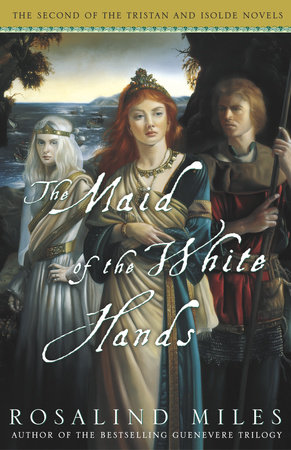The Maid of the White Hands Reader’s Guide
By Rosalind Miles


1. What irreconcilable differences separate Breccan and his brother Tolen? Why does Breccan’s confrontation with Father Eustan and his monks lead to Tolen’s murder? Is the death ever avenged?
2. Merlin has only a brief cameo in this volume of the trilogy. What is the significance of his role? Does the dying queen trust him? Why does she accuse him of cherishing Arthur and Tristan above all others? What does she need Merlin to do?
3. Sir Greuze’s knights follow and obey him long after brain damage on the battlefield claims his sanity, even when they know he perpetrates gory crimes against women. Yet they claim to operate under the code of chivalry. Are there other cases in the story where you find fatal flaws in the rules of chivalry?
4. Three conflicts are brewing throughout the novel: Breccan is drumming up a coup to take the Irish throne; Andred and Elva are making a power play for the Cornish throne; and Dominian is launching an assault on non-Christians. Which attack gains the most ground by the end of the story? How do these plots threaten Isolde and Tristan’s love affair? What is Isolde’s strongest weapon in defending them?
5. Who is the knight promised to Isolde by the Lady of the Sea? Does the fact that Isolde needs to be rescued by a knight at the moment of her crowning undermine her power and authority as queen? What becomes of this savior figure? Who does he claim sent him?
6. Mark’s position as King of Cornwall is tenuous, since he’s technically only a vassal to Queen Igraine. From her perch in Tintagel, Igraine sees and hears everything. Why does she allow Mark to carry on being such a buffoon? Why doesn’t she put a stop to the unsavory influences on him, such as those of Andred and Dominian?
7. Isolde’s mother leaves her court and the nation of Ireland in total disarray when she dies. How well does Isolde put it back together?
8. Kedrin is baffled by his sister’s penchant for ruthlessly pursuing her desires. He thinks: “Treachery was the element in which Blanche lived. Indeed it was not treachery to her but common sense, to make sure that she got what she wanted, whatever the cost.” What do you make of Blanche? Are her father and brother too lenient with her? What does the Chevalier Jacque Saint Rocquefort see in her? Are you satisfied with Blanche’s happy ending?
9. Blanche has no problem convincing Tristan that she’s an innocent maiden being bullied by her father into a brutal marriage with Saint Roc. Can Tristan’s mental and physical exhaustion be blamed for his lapse in judgment? Or is he truly naïve? Where else in the story is Tristan questionable as a judge of character?
10. The Lady of the Sea commands Isolde to focus on her duties as queen and the work at hand, and to let Tristan fend for himself. Does Isolde succeed in obeying these instructions?
11. Isolde has the Sight, allowing her ominous glimpses of the future, and of Tristan’s whereabouts when they are apart. Does she consider the Sight a blessing or a curse? Does it ever mislead her?
12. In denying their affair and defending their innocence, Isolde and Tristan are essentially liars. Does this color the way you perceive them as protagonists? How do they get off the hook when they are cornered by Mark in an open trial at Tintagel? Does Igraine know the truth?
13. After his adventures escaping Duessa, Falsamilla, and Blanche, Tristan laments that he has failed Isolde. Do you agree, or is Tristan being too hard on himself? What were his alternatives?
Just for joining you’ll get personalized recommendations on your dashboard daily and features only for members.
Find Out More Join Now Sign In